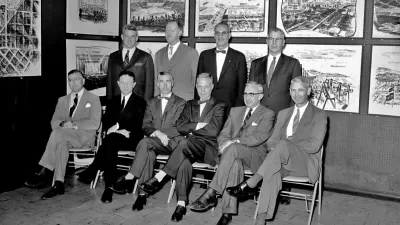Deland Chan, a lecturer in the Urban Studies program at Stanford University and co-founder of the Stanford Human Cities Initiative, makes the case for a bigger tent for planners and planning.

An article by Deland Chan suggests a new definition for the concept of "real planning" to ensure that women get more credit for the contributions to citymaking of the past, and that underrepresented groups have more of a role in the planning of the future.
For instance, Chan cites the work of "women-organized clubs that led the charge for urban beautification at the turn of the 20th century. " Plans like Charles Mulford Robinson’s General Plan for the Improvement of Colorado Springs (1912) erased the contributions of these clubs, in a familiar narrative about men consolidating and protecting their role in the making of history.
That example is a symptom of a larger problem, according to Chan—that the "planning canon, as it currently exists, reinforces a binary notion of what 'real' planning is and isn’t." While the ambitious plans, backed by institutional political and financing clout get credit, "planning from below, and 'soft,' people-centered work like community outreach, are not ascribed the same kind of value." Chan adds:
If we expanded the definition of planning, we might include Majora Carter’s workforce development and environmental justice work in the South Bronx, or Antionette Carroll’s Creative Reaction Lab, which tackles inequity in St. Louis. Carter, Carroll, and many other women leaders are not “real” (i.e. professionally trained and certified) planners, but they have shaped their cities and amplified place-based work already happening in low-income communities of color.
Finally, Chan puts out a call to action to the academic programs around the country to take a leadership role in redefining the scope of what's considered real planning:
To start, colleges and universities that make up the pipeline of future planners should rethink what they teach. It is time to recognize that our shared identity as planners is based on privileging the contributions of certain individuals and groups over others. In specific terms, institutions can reshape curricula to include missing or marginalized voices.
FULL STORY: What Counts as 'Real' City Planning?

Planetizen Federal Action Tracker
A weekly monitor of how Trump’s orders and actions are impacting planners and planning in America.

San Francisco's School District Spent $105M To Build Affordable Housing for Teachers — And That's Just the Beginning
SFUSD joins a growing list of school districts using their land holdings to address housing affordability challenges faced by their own employees.

The Tiny, Adorable $7,000 Car Turning Japan Onto EVs
The single seat Mibot charges from a regular plug as quickly as an iPad, and is about half the price of an average EV.

Austin's First Single Stair Apartment Building is Officially Underway
Eliminating the requirement for two staircases in multi-story residential buildings lets developers use smaller lots and more flexible designs to create denser housing.

Atlanta Bus System Redesign Will Nearly Triple Access
MARTA's Next Gen Bus Network will retool over 100 bus routes, expand frequent service.

Toronto Condo Sales Drop 75%
In two of Canada’s most expensive cities, more condos were built than ever — and sales are plummeting.
Urban Design for Planners 1: Software Tools
This six-course series explores essential urban design concepts using open source software and equips planners with the tools they need to participate fully in the urban design process.
Planning for Universal Design
Learn the tools for implementing Universal Design in planning regulations.
Smith Gee Studio
City of Charlotte
City of Camden Redevelopment Agency
City of Astoria
Transportation Research & Education Center (TREC) at Portland State University
US High Speed Rail Association
City of Camden Redevelopment Agency
Municipality of Princeton (NJ)





























